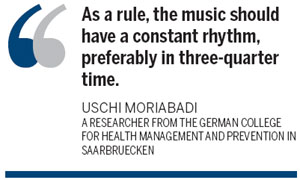
While most runners can't do without music, experts suggest checking its beats per minute to find the one most suited to you. Nina C Zimmermann reports
For many joggers, listening to music while running is part and parcel of the exercise, making what can sometimes be a boring ritual into a much more enjoyable experience.According to Herbert Loellgen, president of the German Society for Sports Medicine and Prevention, music acts as an incentive to run in many cases.
Jogging without music is almost unthinkable for some runners although experts recommend that on occasion the exercise be completed without wearing earphones.
"There are people who need music as a motivation or a distraction and only then are they perhaps in a position to complete their running route," says Uschi Moriabadi from the German College for Health Management and Prevention in Saarbruecken.
There has been little scientific research carried out as to whether music is a help or a hindrance while running but Moriabadi believes that people can run for longer while listening to their favorite music and following its rhythm.

"Playing music along a marathon course would also act as a stimulation," says Loellgen.
"My experience in marathons has generally been neutral. By this I mean that having music groups along the route does not change anything unless the musical rhythm chimes with the running rhythm."
The crux is how many beats per minute (bpm) there are in the music and whether they correlate with the runner's heartbeat, according to a study carried out by sport psychologist Costas Karageorghis from the Brunel University in Uxbridge, England.
"That means between 110 and 130 beats per minute," explains Loellgen.
In this way, the runner's running rhythm stabilizes and increases performance.
The number of steps per minute should also be taken into account, advises Frank Hofmann, editor in chief of Runner's World magazine. A runner who manages 180 strides in 60 seconds should run to music with between 45 and 90 bpm.
Finding out the bpm of a tune isn't as easy at it first might appear. While there are iPhone Apps available to measure bpm, generally the technology is only available in DJ programs.
"As a rule, the music should have a constant rhythm, preferably in three-quarter time," recommends Moriabadi, who believes bpm should track stride rate. She feels that between 130 and 150 bpm is the rate to run to although "130 bpm is probably a little slow and 150 a tick too fast."
Athletes wanting to run faster while also maintaining the same ratio of bpm will be left listening to the likes of heavy metal, music played to a rhythm that is likely to cause more damage than benefits, according to the experts.
"If the music is too fast for the natural running rhythm, then the runner will attempt to follow the music for a while, which leads to an increased pace, faster heart rate and heavier breathing," says Moriabadi, adding that this can quickly lead to over-exertion.
Hofmann agrees that listening to music may not always be beneficial, especially when it comes to high-performance training.
Obviously, personal musical taste plays a role with Loellgen of the view that, as a rule, music tends to bring a welcome distraction from the boredom of running.
Light, friendly music with major keys is preferred to darker, sometimes sad minor keys, says Moriabadi.
Hofmann points out that listening to music helps block out general surrounding noise. "A person should still be able to hear this noise though," he says, citing the example of an approaching car. "This rules out listening to music requiring complete immersion."
Moriabadi, meanwhile, recommends leaving the music at home on some days. "It is important some days to concentrate entirely on the body and feel everything while running," she says.
taken from : China Daily


No comments:
Post a Comment